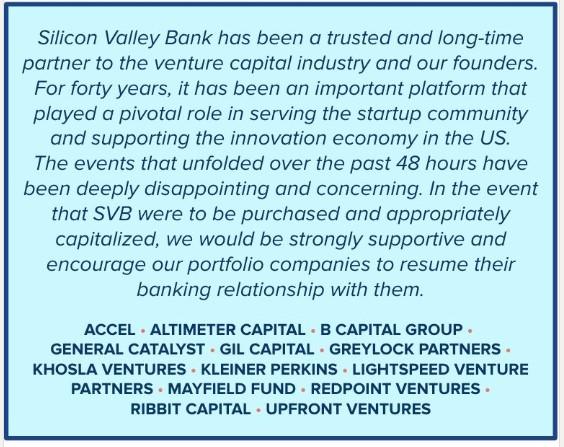The weekend produced a horror show for many in the tech sector, principally because regulators closed Silicon Valley Bank on Friday, a major player in the tech and venture capital community. It was the largest bank failure since the global financial crisis in 2008.
Then on Sunday, regulators moved to close Signature Bank of New York, which is not as aligned to the tech community.
Small venture-backed companies had already been under pressure with higher interest rates and a slowdown for initial public offerings, making it difficult to raise cash. Some startups worried how they would meet their payroll with the SVB closure.
Meanwhile, a group of 13 VC leaders signed a public statement posted on LinkedIn and elsewhere calling the SVB closure "deeply disappointing and concerning." The statement was posted by Hemant Taneja, CEO of General Catalyst, one of the 13.
"In the event that SVB were to be purchased and appropriately capitalized, we would be strongly supportive and encourage our portfolio companies to resume their banking relationship with them," the statement concluded. In addition to General Catalyst, the group of 13 VC firms included Greylock, LIghtspeed Venture Partners, and Kleiner Perkins.
Rumors surfaced Friday that SVB might be sold evaporated hours afterward, according to CNBC and other news outlets, and the future for SVB remained unsettled.

The public post by the 13 VCs brought a response from the head of global product services at SVB, Sanjay Golsalia. "I wish these very same VCs would have banned together and kept their deposits, their porco deposits at SVB and 'stayed calm.'" Golsalia said. "They now have not only very likely lost a valuable bank partner that has served them unconditionally through tough times but will go underserved in new bank relationships. They fundamentally betrayed their partner and have undoubtedly shot themselves in the foot."
While the FVB closure caused near-panic for small companies worried about making their payrolls, many analysts argued the closures would not be more widespread. Regulators for FDIC, US Treasury and Federal Reserve sought to assure the public their money would be available on Monday.
President Biden said he plans to "hold those responsible for this mess fully accountable," in a statement.
"Y'all chill. It's going to be OK," urged Patrick Moorhead, an analyst at Moor Insights & Strategy in a tweet. "Banks fail, Many have. Many more will fail in the future."
After the tumultuous SVC closure, Friday brought a US jobless report for February that many analysts found to be solid with some notable exceptions for tech. The unemployment rate edged up to 3.6% from 3.4% a month earlier. Employment rose by 311,000 people, above expected levels, but there were declines in information and transportation and warehousing—all areas affecting engineers.
By contrast, employment in professional and business services continued to trend up in February with a gain of 12,000 jobs in management, scientific and technical consulting services. Across the prior six months, professional and business services increased by an average of 35,000 per months, according to the US Bureau of Labor Statistics.
RELATED: It’s not Pollyanna to remember tech jobs remain hot, even amid layoffs
More specific to the chip sector, investors on Friday began digesting a report showing January semiconductor sales had dropped 18% globally year-to-year. The Semiconductor Industry Association noted that 2022 was a record year, but then sales cooled in the second half of 2022 and the trend continued into the first month of 2023. Sales year-to-year for January were down the most in China, by 31%, while the Americas saw a 12% decline and Asia Pacific saw a 20% decline.
As with chips, tech jobs have a strong long-term outlook primarily because of the explosion of electronics in a multitude of applications, SIA and employment recruiters have noted.
As for SVB, financial regulators are weighing the impact of its closure on the larger banking community.
On its website, SVB said 44% of US venture-backed tech and healthcare IPOs last year banked there.
SVB had announced Wednesday it was raising $2 billion in capital after a $1.8 billion loss on asset sales. Then shares of its parent, SVB Financial Group, fell 60% on Thursday and dropped 60% more in premarket trading on Friday before being halted. The bank has entered FDIC receivership and FDIC insurance covers up to $250,000 per depositor, per bank.